Skip to content
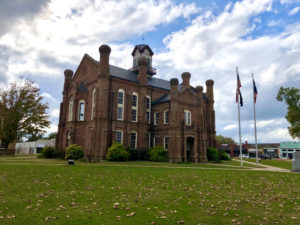
Ahhhh, romantic Irish castles. Something that makes this Irish lady’s heart swoon. But wait…this is no castle at all. It’s actually the Shelby County Courthouse in far east Texas!
Architect John Joseph Emmett Gibson, a native of Ireland who was hired to design the building in Center Texas in 1883, wanted to give his masterpiece the appearance of the castles of his homeland complete with turrets, towers and even secret passageways.
Gibson not only designed and oversaw the construction of the two-story Romanesque Revival courthouse, he had over two million bricks specially made for the project. The mortar was made from sand carried from forty miles away in Louisiana by oxcarts. The glass, vents, and diamond-shaped braces also made the journey from New Orleans and other Southern ports before being transported by oxen.
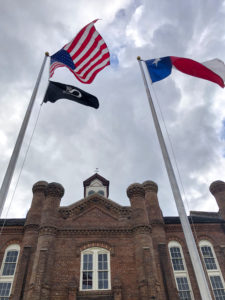 It was a grand undertaking that took two years to complete, but has provided a jewel of a centerpiece to the town square for generations.
It was a grand undertaking that took two years to complete, but has provided a jewel of a centerpiece to the town square for generations.
A total of twelve fireplace chimneys surround the top of the beautiful structure like a crown. Accented with arched entryways, tall slender windows and diminutive buttresses, it’s topped by a frame cupola.
The courthouse has an entry in the middle of each side, but the primary entrance is on the north facade.
The second floor courtroom is a large and lofty space, with exposed wooden trusses supporting the roof that more give the appearance of being inside a cathedral than a courthouse. The curved alcove behind the judge’s bench helped to amplify his voice in the days before sound systems were even a dream.
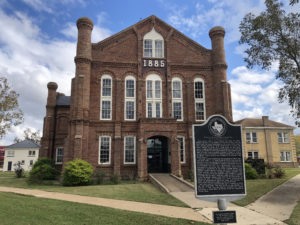 The wooden jury chairs aren’t original, having been obtained from another historic Texas courthouse in Nacogdoches. But the benches used by visitors are not only original, they display a decidedly European detail for those who take the time to look closely: metalwork feet depicting dragons’ feet, wind in back of the benches into the beasts’ bodies, wings and ending in heads peering over the top where they are swallowing their own tails. Probably not something most of the local cowboys and farmers had seen before!
The wooden jury chairs aren’t original, having been obtained from another historic Texas courthouse in Nacogdoches. But the benches used by visitors are not only original, they display a decidedly European detail for those who take the time to look closely: metalwork feet depicting dragons’ feet, wind in back of the benches into the beasts’ bodies, wings and ending in heads peering over the top where they are swallowing their own tails. Probably not something most of the local cowboys and farmers had seen before!
Gibson took Texas’ extreme weather into consideration in his design, utilizing high-arched windows that would open allow breezes to circulate air beneath the vaulted ceiling. It provided some relief from the summer heat, but also caused a bit of a problem with birds flying indoors. One funny story tells of the time that an errant bird circling inside the courtroom was such a distraction that the judge asked if someone could do something about it. One loud, reverberating gunshot later the distraction was gone.
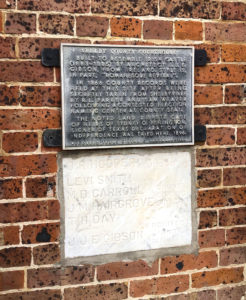
Every good castle should have at least one secret passageway, and the Shelby County Courthouse is no exception. On the floor to the left of the judge’s chair is an escape hatch (yes, really). If the verdict handed down upset the crowd, the judge could open the hatch climb down the stairs and escape through a one-way door. His deputies were in charge of keeping an eye on the crowd until he mounted his horse and got away, before releasing them for the day.
If that were scripted into a Western, it’d be downright comical.
The boards in the center of the courthouse come together at a point said to be the center of the county. When the building was renovated, the local Daughters of the Republic of Texas purchased an 1885 silver dollar coin to have imbedded at that spot.
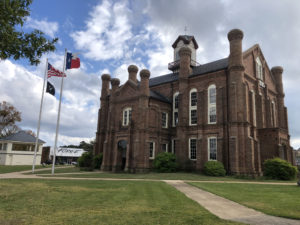
An interesting side note: In 1948, a young Texas congressman began his successful U. S. Senate campaign in front of the Shelby County Courthouse.
The courthouse, now listed on the National Historic Register, cost $26,000 to build, and over $1 million to renovate in the 1980s. But J.J.E. Gibson was never paid for his work. Whether that was an unfortunate oversight or the county just couldn’t afford it remains a bit of a mystery. The sister to the Shelby County Courthouse, it’s identical 1885 twin in Carthage, Panola County, was unfortunately torn down in 1957.
It probably shouldn’t come as any surprise that Texas has more historic courthouses than any other state, but did you know that of the 254 counties in the state – 242 of these treasured pieces of architecture are still in active government use? They can be a terrific focus for making a road trip checklist – helping you choose large and small towns to visit. Do you have a favorite?
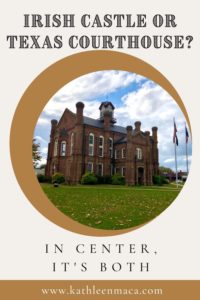
 It was a grand undertaking that took two years to complete, but has provided a jewel of a centerpiece to the town square for generations.
It was a grand undertaking that took two years to complete, but has provided a jewel of a centerpiece to the town square for generations.




